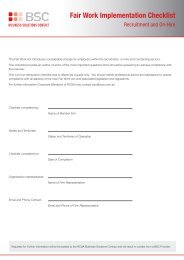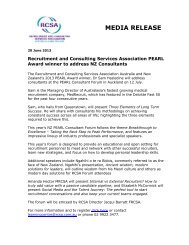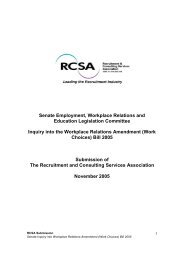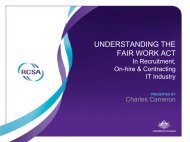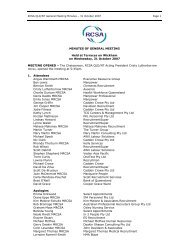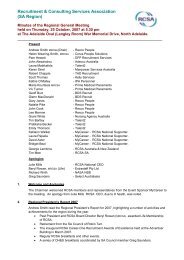Unfair Dismissal - RCSA
Unfair Dismissal - RCSA
Unfair Dismissal - RCSA
You also want an ePaper? Increase the reach of your titles
YUMPU automatically turns print PDFs into web optimized ePapers that Google loves.
the dismissal was not consistent with the Small Business Fair <strong>Dismissal</strong> Code (only<br />
where the employer is a small business employer) (Section 385).<br />
What constitutes harsh, unjust or unreasonable?<br />
Fair Work Australia will look at all the following factors when considering whether a<br />
dismissal was harsh, unjust or unreasonable:<br />
<br />
<br />
<br />
<br />
<br />
<br />
<br />
whether there was a valid reason for the dismissal related to the person’s capacity or<br />
conduct (including its effect on the safety and welfare of other employees);<br />
whether the person was notified of that reason;<br />
whether the person was given any opportunity to respond to that reason;<br />
any unreasonable refusal by the employer to allow the person to have a support<br />
person present to assist at any discussions relating to the dismissal;<br />
if the dismissal was related to unsatisfactory performance by the person – whether<br />
the person had been warned about the unsatisfactory performance before the<br />
dismissal;<br />
whether the size of the employer’s enterprise is likely to impact on the procedures<br />
followed in the dismissal;<br />
whether a lack of dedicated human resource management specialists or expertise in<br />
the employer’s enterprise are likely to impact on the procedures followed in the<br />
dismissal; and<br />
any other matters that Fair Work Australia considers relevant (Section 387).<br />
General Protections<br />
There are prohibitions against dismissing someone on discriminatory grounds or for other<br />
reasons such as engaging in industrial activity or being temporarily absent from work<br />
because of illness or injury. This is not the same as unfair dismissal and is dealt with under<br />
the General Protections part of the Fair Work Act 2009 (Part 3‐1).<br />
What is genuine redundancy?<br />
Genuine redundancy is where an employee’s job is no longer required to be performed by<br />
anyone because of changes in the operational requirements of the business.<br />
Possible examples of changes in the operational requirements of an enterprise include:<br />
• a machine is now available to do the job performed by the employee<br />
• the employer’s business is experiencing a downturn, for example, the employer only<br />
needs three people to do a particular task or duty instead of five<br />
• the employer is restructuring their business to improve efficiency and the tasks done<br />
by a particular employee are distributed between several other employees and<br />
therefore the person’s job no longer exists.<br />
It is not a case of genuine redundancy if the person dismissed could have been redeployed in<br />
another position within the business or “associated entity” and it would have been<br />
reasonable in all the circumstances to redeploy them (Section 389).<br />
In any selection process for determining which employee’s are made redundant, the<br />
employer must ensure that the process is in accordance with any provision of any applicable<br />
modern award, enterprise agreement or transitional instrument and is not discriminatory.<br />
2



